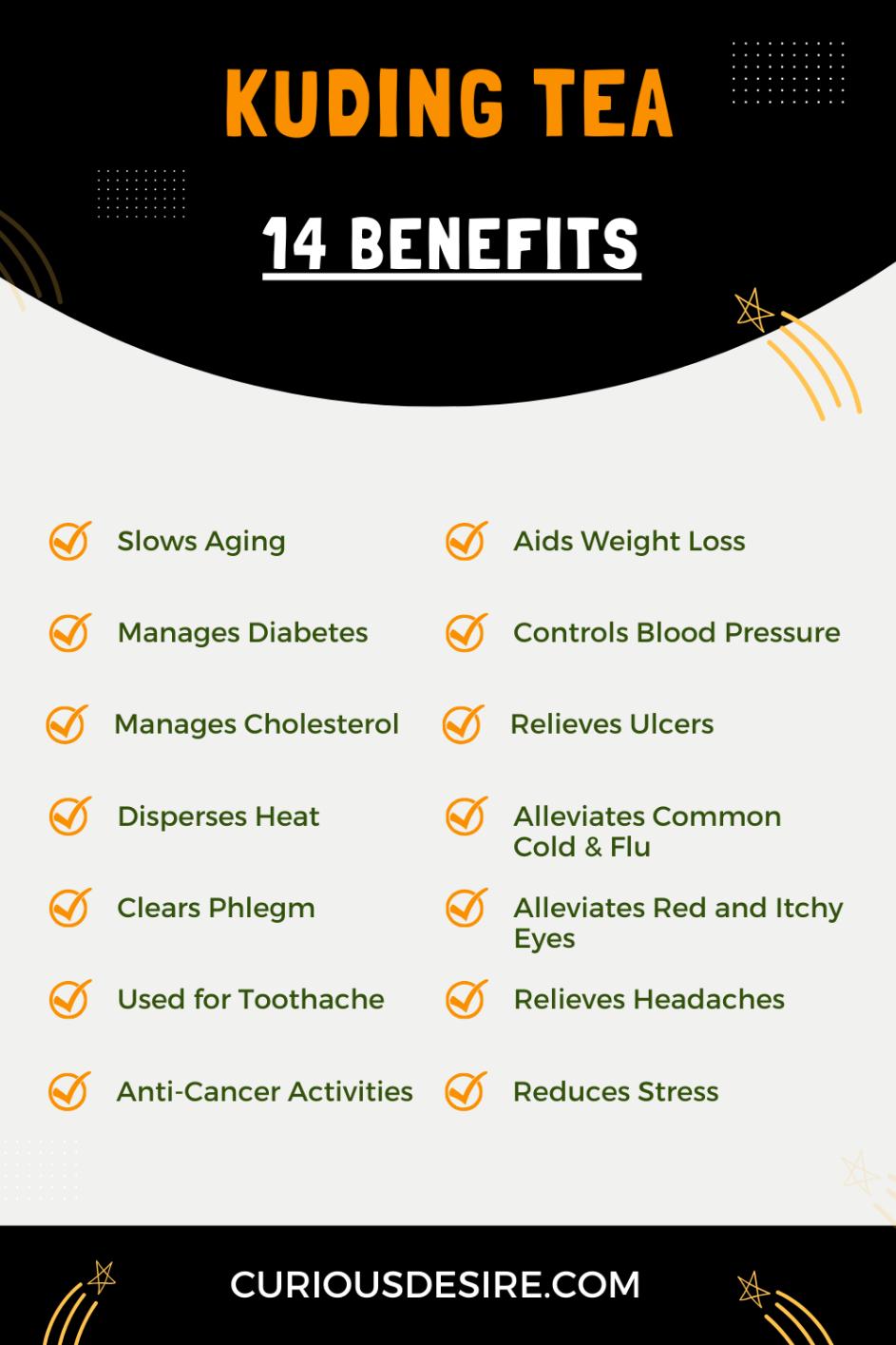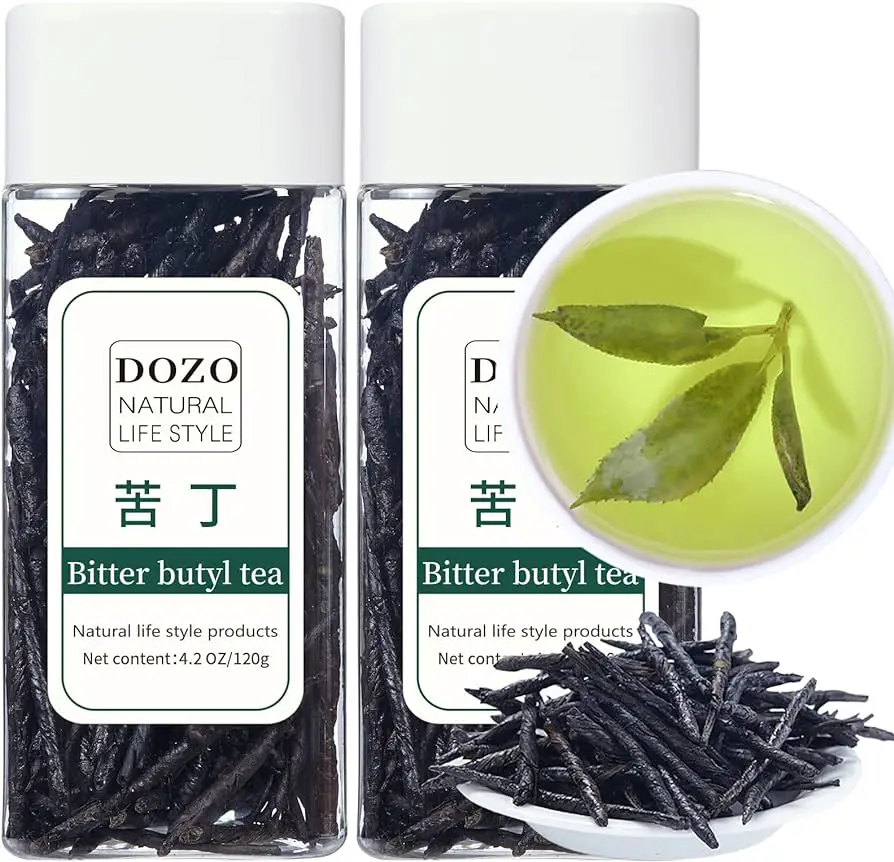Humans, since the beginning, have sought things that can help them survive in harsh earth conditions.
One valuable asset they found is Kuding tea. It has numerous amazing benefits that can simply amaze you.
We will discuss those benefits with you today so that you can make a wise choice of adding this valuable tea to your routine.
Here are the top 5 benefits of Kuding Tea:
- Controls Blood Pressure
- Disperses Heat in the Body
- Relieves Headaches
- Potential Anti-Cancer Activities
- Aids Weight Loss
[toc]

Benefit 1: Slows Aging
One of the amazing qualities of Kuding tea lies in the presence of powerful antioxidants such as catechins and flavonoids. They protect our skin cells from free radicals, slowing down the aging process.
By safeguarding collagen and elastin, essential for skin elasticity, Kuding tea reduces the appearance of wrinkles, leaving your skin looking youthful and radiant.
Regular consumption of Kuding tea contributes to maintaining a healthy, glowing complexion.
Benefit 2: Aids Weight Loss
Kuding tea serves as a helpful companion in weight loss journeys.
With its moderate caffeine content, it boosts metabolism, supporting fat burning and potentially aiding in shedding excess weight (source).
Additionally, its appetite-curbing properties help in reducing calorie intake, making it a supportive element in weight management efforts.
Benefit 3: Manages Diabetes
For those managing diabetes, Kuding tea proves to be a beneficial addition.
Its antioxidants help protect against oxidative stress while simultaneously improving blood sugar levels by stabilizing insulin sensitivity, says a source.
Also, other natural compounds, including polyphenols and flavonoids, play a role in regulating glucose levels.
This dual action helps control high blood sugar, making Kuding tea a valuable part of a diabetes-friendly diet.
Benefit 4: Controls Blood Pressure
Kuding tea’s ability to relax blood vessels contributes to maintaining healthy blood pressure levels, an idea supported by TeaSpring.com.
By promoting better blood flow, it supports heart health, reducing the risk of complications associated with high blood pressure.
Regular consumption adds a natural touch to cardiovascular well-being.
Benefit 5: Manages Cholesterol
Kuding tea plays a role in managing cholesterol levels by regulating lipid metabolism.
It helps lower “bad” LDL cholesterol while promoting the levels of “good” HDL cholesterol.
This balance supports overall cardiovascular health and lowers artery-clogging risk, contributing to a healthier heart.
Benefit 6: Relieves Ulcers and Stomach Injuries
Kuding tea is known for its soothing properties that can bring relief to individuals dealing with ulcers or stomach injuries.
The tea’s anti-inflammatory nature helps calm the digestive tract, reducing irritation and discomfort.
By promoting a gentle healing process, Kuding tea contributes to the overall well-being of the stomach.
Benefit 7: Disperses Heat in the Body
In traditional Chinese medicine, Kuding tea is considered a “cooling” herb, which means it can help disperse excess heat within the body.
This cooling effect is believed to bring balance, especially during periods of internal heat buildup.
People often turn to Kuding tea during warm weather to cool down and alleviate feelings of restlessness or irritability.
Benefit 8: Prevents and Alleviates Common Cold and Flu
Kuding tea’s immune-boosting properties make it a potential ally in preventing and alleviating the symptoms of the common cold and flu.
The bioactive compounds in the tea enhance the immune system’s ability to combat viral infections.
Additionally, Kuding tea’s anti-inflammatory effects may relieve symptoms like a stuffy nose and a sore throat during respiratory illnesses.
Benefit 9: Stops Coughing and Clears Phlegm
For those grappling with a persistent cough or congestion, Kuding tea’s mild expectorant properties can offer relief.
Tea Village refers to it as a powerful tool against coughs, as it acts by aiding in breaking down and expelling phlegm from the respiratory system.
Therefore it serves as a natural remedy for respiratory discomfort
Benefit 10: Alleviates Red and Itchy Eyes
Kuding tea is believed to provide relief for red and itchy eyes.
Its calming and anti-inflammatory properties may reduce eye irritation, offering comfort and supporting overall eye health.
Regular consumption of Kuding tea may contribute to maintaining clear and healthy eyes, making it a simple and natural option for those seeking eye relief.
Benefit 11: Used for Toothache and Bad Breath
Kuding tea’s potential antimicrobial properties make it a traditional remedy for toothache and bad breath.
By incorporating it into your oral care routine, you may experience a healthier mouth, potentially preventing toothaches and ensuring fresher breath.
Its simplicity and natural qualities make Kuding tea an accessible choice for oral health.
Benefit 12: Relieves Headaches
For individuals dealing with headaches, Kuding tea’s calming and analgesic properties can bring relief.
Its ability to alleviate tension and stress-related headaches provides a natural alternative for those seeking comfort.
Enjoying a cup of Kuding tea may offer a simple and soothing remedy for occasional headaches.
Benefit 13: Potential Anti-Cancer Activities
While more research is needed, studies suggest that Kuding tea extract may possess potential anti-cancer properties.
The presence of bioactive components like polyphenols hints at possible benefits in inhibiting the growth of cancer cells.
This possibility makes thinking about Kuding tea’s health benefits valuable, but we’re still waiting for more definite proof.
Benefit 14: Reduces Stress
Kuding tea has a traditional association with stress reduction.
Its calming effects on the nervous system may help alleviate stress and anxiety, contributing to mental well-being.
The simple act of sipping on a cup of Kuding tea provides a moment of relaxation, making it an accessible and natural way to unwind.
Kuding Tea Benefits FAQs
1. Can Kuding Tea Lower Cholesterol?
Yes, Kuding tea has been associated with the potential to lower cholesterol.
Studies suggest that the tea may play a role in regulating lipid metabolism, reducing levels of LDL (“bad”) cholesterol while promoting HDL (“good”) cholesterol.
However, individual responses may vary, and it’s advisable to consult with a healthcare professional for personalized advice.
2. Is Kuding Tea the Same as Green Tea?
No, Kuding tea and green tea are different. While both are derived from plants, Kuding tea comes from the leaves of the Ilex kudingcha plant, whereas green tea is made from the Camellia sinensis plant.
They have distinct flavors, appearances, and potential health benefits.
3. Is Kuding Tea Good for Fatty Liver?
Kuding tea is believed to have potential benefits for fatty liver.
The tea has been studied for its role in improving lipid metabolism, which may contribute to reducing fat accumulation in the liver.
However, specific effects on fatty liver may depend on various factors, and it’s recommended to consult with a healthcare professional for personalized advice.
4. Why Is Kuding Tea Bitter?
The bitterness of Kuding tea is attributed to its unique composition of bioactive compounds, including polyphenols and flavonoids.
These compounds contribute to the tea’s distinct flavor profile.
The bitterness is often considered a characteristic feature, and some individuals may find the taste acquired over time.
5. What Is the Work of Kuding?
Kuding tea is traditionally used in Chinese medicine for various purposes.
It is believed to disperse heat in the body, promote circulation, alleviate respiratory discomfort, and potentially offer antioxidant benefits.
Its diverse properties make it a popular choice for promoting overall well-being.
6. What’s the Best Tea to Drink for Weight Loss?
The best tea for weight loss can vary based on individual preferences and health conditions.
Green tea, including Kuding tea, is often considered beneficial due to its potential to boost metabolism and aid in fat burning.
However, the effectiveness of tea for weight loss is best complemented by a healthy diet and lifestyle.
It’s advisable to choose teas without added sugars and consult with a healthcare professional for personalized advice.
